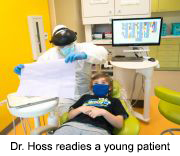
The COVID-19 pandemic may be stressing out most people, but it has had a surprising upside for college students: They’re sleeping better. That’s the upshot of a new study that investigated sleep habits of 139 college students before and after Colorado enacted a stay-at-home order to prevent spread of the new coronavirus. “In the end,… read on >






























